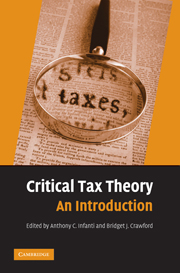Book contents
- Frontmatter
- Contents
- List of Illustrations
- List of Tables
- List of Contributors
- List of Common Abbreviations
- Introduction
- CHAPTER 1 FOUNDATIONS OF CRITICAL TAX THEORY
- CHAPTER 2 HISTORICAL PERSPECTIVES ON TAXATION
- Dollars and Selves: Women's Tax Criticism and Resistance in the 1870s
- Split Income and Separate Spheres: Tax Law and Gender Roles in the 1940s
- The Rhetoric of the Anti-Progressive Income Tax Movement: A Typical Male Reaction
- CHAPTER 3 THE GOALS OF TAX POLICY
- CHAPTER 4 CRITICAL TAX THEORY MEETS PRACTICE
- CHAPTER 5 RACE AND TAXATION
- CHAPTER 6 GENDER AND TAXATION
- CHAPTER 7 SEXUAL ORIENTATION AND TAXATION
- CHAPTER 8 THE FAMILY AND TAXATION
- CHAPTER 9 CLASS AND TAXATION
- CHAPTER 10 DISABILITY AND TAXATION
- CHAPTER 11 GLOBAL CRITICAL PERSPECTIVES ON TAXATION
- CHAPTER 12 CRITICAL PERSPECTIVES ON CRITICAL TAX THEORY
- Index
The Rhetoric of the Anti-Progressive Income Tax Movement: A Typical Male Reaction
Published online by Cambridge University Press: 04 August 2010
- Frontmatter
- Contents
- List of Illustrations
- List of Tables
- List of Contributors
- List of Common Abbreviations
- Introduction
- CHAPTER 1 FOUNDATIONS OF CRITICAL TAX THEORY
- CHAPTER 2 HISTORICAL PERSPECTIVES ON TAXATION
- Dollars and Selves: Women's Tax Criticism and Resistance in the 1870s
- Split Income and Separate Spheres: Tax Law and Gender Roles in the 1940s
- The Rhetoric of the Anti-Progressive Income Tax Movement: A Typical Male Reaction
- CHAPTER 3 THE GOALS OF TAX POLICY
- CHAPTER 4 CRITICAL TAX THEORY MEETS PRACTICE
- CHAPTER 5 RACE AND TAXATION
- CHAPTER 6 GENDER AND TAXATION
- CHAPTER 7 SEXUAL ORIENTATION AND TAXATION
- CHAPTER 8 THE FAMILY AND TAXATION
- CHAPTER 9 CLASS AND TAXATION
- CHAPTER 10 DISABILITY AND TAXATION
- CHAPTER 11 GLOBAL CRITICAL PERSPECTIVES ON TAXATION
- CHAPTER 12 CRITICAL PERSPECTIVES ON CRITICAL TAX THEORY
- Index
Summary
This title is not exactly true; it's not exactly false either. It contains a truth that has been shaped by my preferences (or, if you wish, my biases, philosophy, or prejudices) and by my desire to grab the reader's attention and force him (and I mean him) to reach a specific conclusion. It is, in short, rhetoric. In that respect it is not unlike many of the arguments now popularly raised against the progressive income tax. My argument differs from many others in its open acknowledgment of the use of rhetoric.
The progressive income tax is currently under siege. This is a new phenomenon: new not in the fact of the opposition itself, but in the extent of the opposition. In 1913, the general public, economists, and politicians argued about the exact schedule of rates and exemptions, but the idea of graduated or progressive rates was accepted with surprising ease and generally has remained unquestioned ever since. The economic and political consensus about progressivity began to fall apart sometime in the 1970s. Two alternatives to progressivity gained strength: a modified flat or proportionate income tax and an expenditure- or consumption-based tax. An expenditure-based tax proved politically unacceptable but the (modified) flat tax alternative gained strength and culminated in the Tax Reform Act of 1986. The drastic erosion of support for progressivity spurred the writing of this article. Before we consent to this erosion we should reevaluate the arguments upon which it is based.
Neoconservative philosophy, with its belief in the primacy of individual rights, both leads to and is supported by the belief in the efficacy of the market as the means to achieve each person's rights and satisfactions most fully.
- Type
- Chapter
- Information
- Critical Tax TheoryAn Introduction, pp. 28 - 38Publisher: Cambridge University PressPrint publication year: 2009



